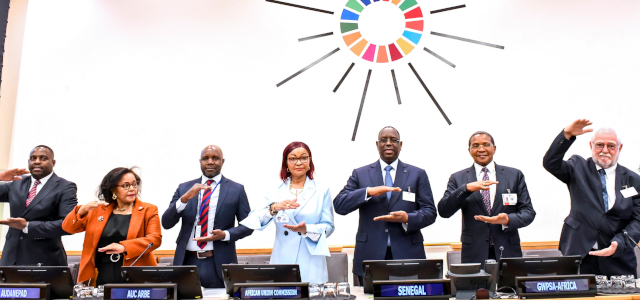This is the key message from the launch of Mind the Gap – Invest in Water, a campaign championed by the African Union Commission and supported by the International High-Level Panel on Water Investments for Africa, as part of the Continental Africa Water Investment Programme (AIP).
Mind the Gap – Invest in Water was launched on 19 September on the side-lines of the 78th United Nations General Assembly and 2023 Sustainable Development Goal (SDG) Summit in New York. Watch the full event recording here.
The 2023 SDG Summit takes place at the midpoint to 2030 SDG deadline, and includes in its Political Declaration a commitment to address water scarcity and stress. Approximately US$50 billion annually is required to achieve water security in Africa by 2030. Currently, US$10-US$19 billion is invested each year. New sources of funding are urgently needed to accelerate implementation of the AIP to achieve water related SDGs on the continent.
Mind the Gap – Invest in Water will raise awareness, influence change, and ultimately – prompt mobilisation of investments across continental institutions and organisations.
“The campaign we are launching here is the starting point of a race against time. The next step is the finalization of the AIP Water Investment Action Plan, in order to launch it on the sidelines of COP 28 in Dubai. It will then be a matter of implementing it for a first evaluation at the 2026 Water and Sanitation Conference, before the SDG deadline in 2030. The emergency is clear. The needs are known and the roadmap drawn up. Let us act without delay to meet the challenge,” said H.E. Macky Sall, President of the Republic of Senegal.
“The continent must create an enabling environment to mobilize domestic and international investments to meet the region’s ambitious vision of the US$30 billion per year by 2030. This will require a combination of measures to strengthen the institutional regulation for water investments and valuing efficient water use across sectors and industries. International corporation and the engagement of the development finance institutions will also be fundamental to de-risk water investments and leverage larger funding streams,” said Amina Mohammed, Deputy Secretary-General of the United Nations and Chair of the United Nations Sustainable Development Group.
African countries are currently losing up to US$200 billion/year due to insufficient investment, coupled with the impacts of climate change and inefficiencies. Over 300 million Africans do not have access to clean drinking water and over 700 million live without access to good sanitation. Without action, climate change will make water shortages worse and lead to more food insecurity, disease burden, human displacement, conflict.
Mind the Gap – Invest in Water will address systemic challenges, or gaps, that deter investors including:
- Governance Gap: the need for robust national water policies, effective regulations, and strategies that are multi-sectoral, comprehensive, and gender transformative.
- Finance Gap: the need for credit worthy water utilities and service providers; return on investment; risk mitigation strategies and public-private investment modalities.
- Capacity: the need for improved implementation capacity and quality of a portfolio of bankable (and less bankable) projects through increased partnerships with regional and national finance institutions
“We have reached a stage where the AU Commission, in collaboration with the International High-Level Panel on Water, is embarking on the Water Investment Action Plan for increased investment in the water sector by the AU Member States. The Mind the Gap campaign will contribute immensely towards mobilising these investments, which are critical for resilient water security and sustainable sanitation in Africa. This move aligns with the outcome of the Africa Climate Summit held recently in Kenya in early September 2023,” said H.E. Moussa Faki Mahamat, Chairperson, African Union Commission.
“We are midway to our Sustainable Development Goals 2030 deadline and it is now clear that without accelerated and urgent action, coupled with high-level political guidance, we will not achieve the SDGs. In Africa, progress on SDG 6 – clean water and sanitation for all – is far too slow. Without SDG 6, Africa cannot achieve its developmental goals on health, food security, economic growth, climate action, and many others. We are offered an opportunity to change course and reconsider the way we are think about investing in water and sanitation,” said H.E. Jakaya Kikwete, former President of United Republic of Tanzania and High-Level Panel Alternate Co-Chair.
The campaign will speak to the nine potential sources of finance for water investment in Africa, which were outlined by the High-Level Panel’s Pyramid of Water Transformation, which also shows the total estimated value of funding that is available; and the potential funding that could be mobilized or leveraged for Africa by 2030.
- Sector governance: Efficiency gains and cost savings
- Valuing water-related risks and internalising the environmental costs
- Institutional investors
- Pollution and mineral resource taxes
- African Government Budgets
- National banks, microfinance institutions, local governments
- Multilateral climate funds
- Multilateral and Development Finance Institutions
- Bilateral ODA and philanthropy
AIP Pyramid of Water Transformation
The High-Level Panel is a registered United Nations 2023 Water Action Agenda commitment (view the commitment here), and will mobilise resources to implement the water actions in the 2030 Agenda for Sustainable Development.
Download the Press Release in English | Francais.
Media Contact:
Maryanne Muriuki, Communications Analyst – Disaster Risk Reduction Unit, Department of Agriculture, Rural Development, Blue Economy and Sustainable Environment, African Union Commission, MuriukiM@africa-union.org
Svetlana Doneva, Panel Secretariat Communication Advisor, +27827976103, svetlana.doneva@gwpsaf.org
Cover image: African leaders show the “gap” during the campaign launch in the United Nations HQ. (Centre left) H.E. Macky Sall, President of the Republic of Senegal; (Second from left) H.E. Jakaya Kikwete, Former President of the United Republic of Tanzania; (Centre) H.E. Josefa Sacko, African Union Commissioner, ARBE; (Centre left) Harsen Nyambe, Director: Blue Economy and Sustainable Environment at the African Union; (Second from left) Nardos Bekele-Thomas, CEO of AUDA-NEPAD; (Right) Hon. Carl Schlettwein, Minister of Agriculture, Water, & Forestry, Namibia; (Left) Alex Simalabwi, Executive Director: High-Level Panel Secretariat
